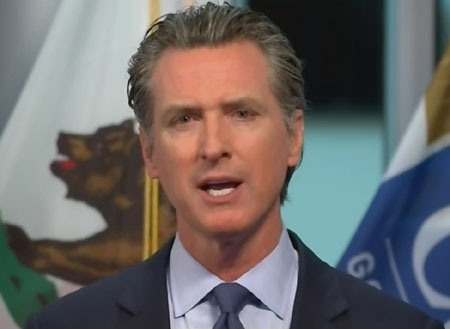FPI / June 16, 2020
By Judicial Watch
Judicial Watch has filed a motion for a preliminary injunction to bar the enforcement of California Gov. Gavin Newsom’s executive order mandating that unrequested and unneeded mail-in ballots be sent to all of the state’s registered voters for the Nov. 3 election.
Judicial Watch argued it is imperative that the court grant preliminary relief now to resolve the legal questions surrounding Newsom’s vote-by-mail mandate. It argued that Newsom’s order, if left intact, will lead to “serious disputes later, possibly having a nationwide impact.”

“Newsom’s ‘vote-by-mail’ mandate must be halted now – as mailing millions of ballots to dirty voting lists in violation of the law could cause a constitutional conflagration over the results of the 2020 elections,” said Judicial Watch President Tom Fitton.
Judicial Watch filed the motion in the United States District Court for the Eastern District of California on behalf of former congressman Darrell Issa (a candidate for California’s 50th Congressional District in the November election) and four voters from across the political spectrum.
On May 8, Newsom issued Executive Order N-64-20, which changed the time, place, and manner for voting during the Nov. 3 federal election. The order mandated that “[a]ll voters who are […] registered to vote” in the November election must be sent mail-in ballots, regardless of whether voters requested them.
The 117th Congress will meet on Jan. 6, 2021 to certify each state’s electoral votes. During that process, Congress will have the right to voice its objection to the counting of any state’s electoral votes. If on that date the electoral margin between the President Donald Trump and Joe Biden is less than 55 electoral votes, the dispute over the legality of Newsom’s executive order “may take on even greater significance,” Judicial Watch argues. “Granting preliminary relief now resolves the legal question before it deteriorates into an intractable political question later. It is in the public interest to have the courts resolve this legal question to ensure that California’s electors are counted.”
California’s Voter’s Choice Act (VCA), passed in 2016, allows counties to conduct all-mail ballot elections if they meet certain specified conditions. In the March primaries, only 15 California counties conducted their elections as all-mail ballot elections under the VCA. The other 43 counties did not.
The particular risks associated with mailed ballots were acknowledged 15 years ago by the bi-partisan Carter-Baker Commission. It observed that “[a]bsentee [mail-in] ballots remain the largest source of potential voter fraud.”
In April, similar concerns were expressed by a Stanford University study, which was commenced prior to the onset of the COVID-19 pandemic. The study noted that there are “concerns around vote-by-mail relat[ing] to preserving election integrity and voter confidence in the process. When a voter votes from home, they are doing so outside the supervision of election officials.” Opportunities for “foul play” occur “throughout the chain of custody of the ballot, beginning with how a voter requests a ballot and then receives, completes, and returns it.”
Judicial Watch attorneys also raised concerns about mailing millions of ballots to dirty voting lists in California:
[G]iven that California failed to comply with the National Voter Registration Act (NVRA) list maintenance provisions for twenty years, this harm will be significant because the State’s voter registration lists are not ready for a broad-based, all-mailed ballot election and will not be ready by November 3, 2020. California will flood the state with ballots mailed to countless voters at locations they no longer reside, including some that moved almost twenty years ago. … Further, since it takes at least two federal election cycles before most voters can be removed under the NVRA, there is no quick fix to the problems identified with California’s voter registration lists. Just the damage this will do to the confidence in California’s elections is significant and irreparable. Without preliminary relief, it will be impossible to reverse or enjoin EO N-64-20 once ballots are mailed out.California Government Code Section 8571 provides that during a state of emergency Gov. Newsom “may suspend any regulatory statute, or statute prescribing the procedure for conduct of state business, or the orders, rules, or regulations of any state agency” provided he “determines and declares that strict compliance … would in any way prevent, hinder, or delay the mitigation of the effects of the emergency.” But, Judicial Watch argued, “the governor is not seeking to suspend anything in Executive Order N-64-20. Instead, he is attempting to impose an entirely new election system on the State and transform permissive provisions under California law into mandatory provisions. Such transformation is not ‘suspending’ even under the most deferential interpretation of his emergency authority.”
Judicial Watch sued to stop the Newsom mandate last month.
According to the U.S. Constitution, only state legislatures may determine the “Times, Places and Manner of holding Elections for Senators and Representatives,” and only state legislatures may establish the manner in which electors to the Electoral College are appointed.
Judicial Watch has long been investigating violations of federal voting law committed by California, including violations of the NVRA.
In 2018, California settled a federal lawsuit with Judicial Watch and began the process of removing up to 1.6 million inactive names from Los Angeles County’s voter rolls. Judicial Watch late last year sent notices to 11 additional California counties warning them of voting list maintenance issues.
FPI, Free Press International
